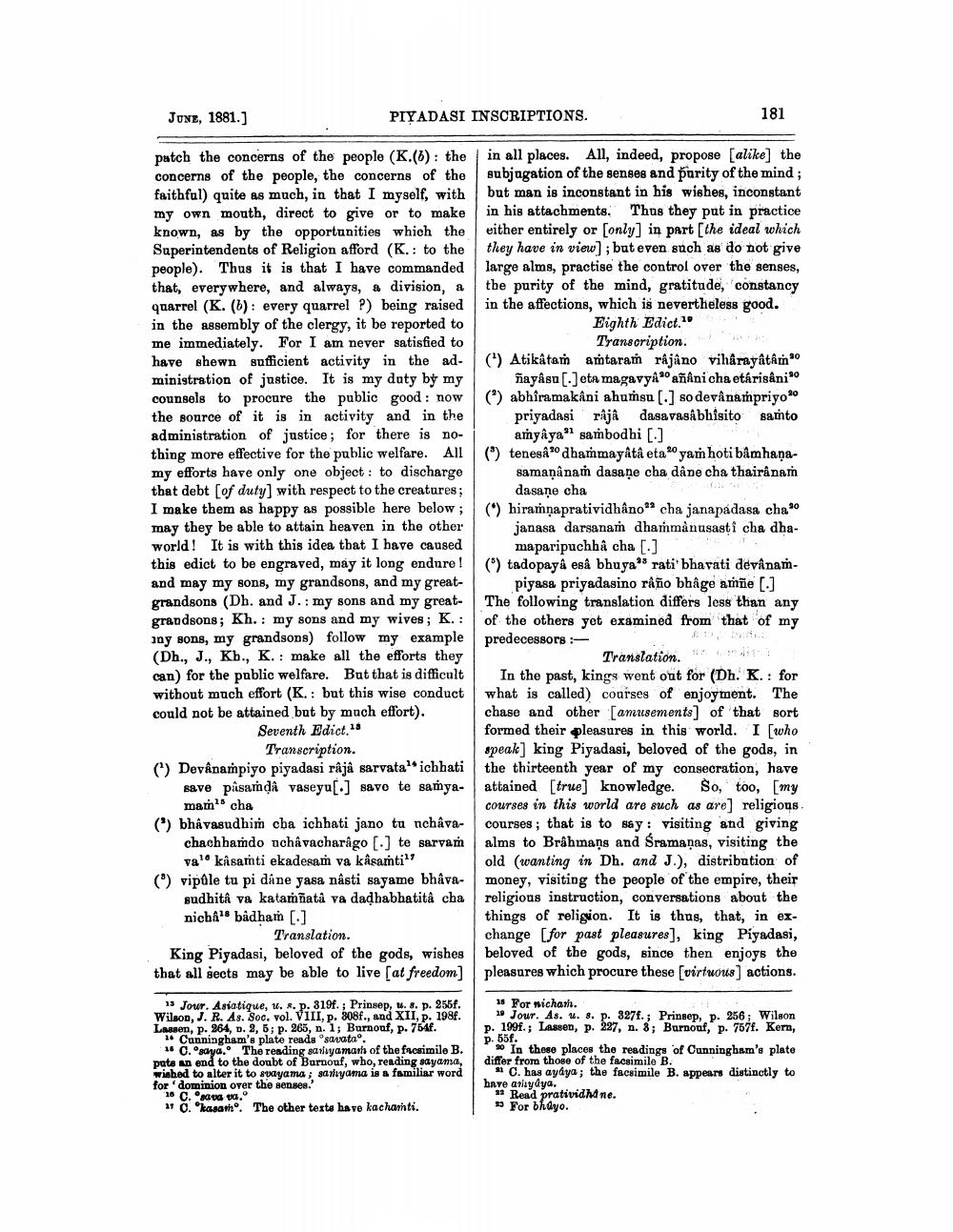________________
JUNE, 1881.]
PIYADASI INSCRIPTIONS.
181
patch the concerns of the people (K.(6): the concerns of the people, the concerns of the faithful) quite as much, in that I myself, with my own mouth, direct to give or to make known, as by the opportunities which the Superintendents of Religion afford (K.: to the people). Thus it is that I have commanded that, everywhere, and always, a division, a quarrel (K. (b): every quarrel ?) being raised in the assembly of the clergy, it be reported to me immediately. For I am never satisfied to have shewn sufficient activity in the administration of justice. It is my duty by my counsels to procure the public good : now the source of it is in activity and in the administration of justice; for there is nothing more effective for the public welfare. All my efforts have only one object : to discharge that debt [of duty) with respect to the creatures; I make them as happy as possible here below; may they be able to attain heaven in the other world! It is with this idea that I have caused this edict to be engraved, may it long endure! and may my sons, my grandsons, and my greatgrandsons (Dh. and J.: my sons and my greatgrandsons; Kh.: my sons and my wives; K. : say sons, my grandsons) follow my example (Dh., J., Kb., K. : make all the efforts they can) for the public welfare. But that is difficult without much effort (K.: but this wise conduct could not be attained but by much effort).
Seventh Edict.13
Transcription. ( Devanampiyo piyadasi râjâ sarvata" ichhati
save påsandå vaseyu[.] savo te samya
mama cha () bhậvasudhim cha ichhati jano tu nchava
chach hamdo uchávacharago [.) te sarvam
va! kâsamti ekadesam va kasamti" () vipöle tu pi dane yasa násti sayame bhava
Budhitâ va katamiatå va dadhabhatità cha nicht badham .
Translation. King Piyadasi, beloved of the gods, wishes that all sects may be able to live [at freedom]
in all places. All, indeed, propose [alike) the subjugation of the senses and parity of the mind; but man is inconstant in his wishes, inconstant in his attachments. Thus they put in practice either entirely or [only] in part [the ideal which they have in view); but even such as do not give large alms, practise the control over the senses, the purity of the mind, gratitude, constancy in the affections, which is nevertheless good.
Eighth Edict.10
Transcription. (1) Atikåtar antara rájáno viharayâtain "
nayasu (.) eta magavya* añanicha etárisânia ©) abhiramakâni ahumsu (.] so devånampriyo
priyadasi râjâ dasavasábhisito santo
amyâya" sambodhi [.] () tenesâ dhammayâtâ eta 20 yam hoti båmhaņa
samaņânam dasaņe cha dåpe cha thairânar
dasaņe cha () hiramņapratividhâno* cha janapadasa cha"
janasa darsanam dhammanusasti cha dha
maparipuchhả cha [.] (*) tadopaga eså bhuyao rati bharati devânam
piyasa priyadasino råño bhâge amie C.] The following translation differs less than any of the others yet examined from that of my predecessors :
Translation. ** * In the past, kings went out for (Dh. K. : for what is called) courses of enjoyment. The chase and other [amusements] of that sort formed their pleasures in this world. I [who speak] king Piyadasi, beloved of the gods, in the thirteenth year of my consecration, have attained (true) knowledge. So, too, [my courses in this world are such as are] religious courses; that is to say: visiting and giving alms to Brahmans and Sramaņas, visiting the old (wanting in Dh. and J.), distribution of money, visiting the people of the empire, their religious instruction, conversations about the things of religion. It is thus, that, in exchange (for past pleasures], king Piyadasi, beloved of the gods, since then enjoys the pleasures which procure these [virtuous) actions.
13 Jour. Asiatique, u. r. p. 319f. ; Prinsep, W. 8. p. 255f. Wilson, J. R. As. Soc. vol. VIII, p. 308f., and XII, p. 1984. Lassen, p. 264, n. 2, 5; p. 265, n. 1; Burnouf, p. 764.
2. Cunningham's plate reads sawatao.
16 C. saya.. The reading sarıyamam of the facsimile B. pata an end to the doubt of Burnouf, who, reading sayama, wished to alter it to svayama; samyama is a familiar word for dominion over the senses.'
26 C. sava ta. 11. kasam". The other tests have kachanti.
15 For wichan.
four. As. w. s. p. 327f.; Prinsep, p. 256; Wilson p. 199f.; Lassen, p. 227, n. 3; Burnouf, p. 757f. Kern, P. 55f.
20 In these places the readings of Cunningham's plate differ frora those of the facaimile B.
* C. has ayaya; the facsimile B. appears distinctly to have anlıydya.
52 Read pratividhi ne. * For bhayo.




